
-
 A wedge is being quickly driven through Pretoria's political elite. Among the victims of this power struggle are vast numbers of poor people. The poor are starting to bear the brunt of the diverse shakeouts in the ongoing confrontation now underway between the country's two most powerful 21st century politicians: President Jacob Zuma and his predecessor Thabo Mbeki. That battle began in 2005, when Mbeki sacked then-deputy president Zuma following a corruption conviction against a long-time Zuma associate.
A wedge is being quickly driven through Pretoria's political elite. Among the victims of this power struggle are vast numbers of poor people. The poor are starting to bear the brunt of the diverse shakeouts in the ongoing confrontation now underway between the country's two most powerful 21st century politicians: President Jacob Zuma and his predecessor Thabo Mbeki. That battle began in 2005, when Mbeki sacked then-deputy president Zuma following a corruption conviction against a long-time Zuma associate. -
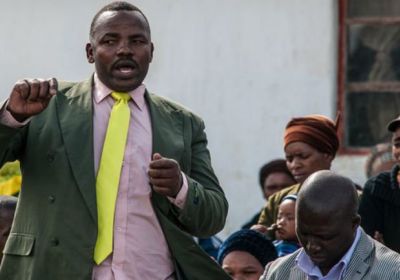 Sikhosiphi “Bazooka” Rhadebe, chairperson of the Amadiba Crisis Committee and a leading campaigner against the Australian-owned Xolobeni mineral sands mine in South Africa was shot dead in his home on March 22.
Sikhosiphi “Bazooka” Rhadebe, chairperson of the Amadiba Crisis Committee and a leading campaigner against the Australian-owned Xolobeni mineral sands mine in South Africa was shot dead in his home on March 22. -
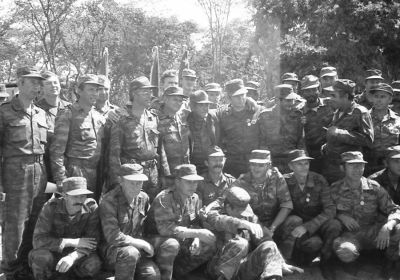 Angolan President Jose Eduardo dos Santos recognised and thanked Cuba on November 12 for its important support in achieving national independence 40 years ago. Commemorating four decades of independence from colonial powers, dos Santos invited a Cuban delegation to honour the historical events that led Fidel Castro to deploy 36,000 troops to defend Angola from a US-back military invasion by forces of apartheid South Africa.
Angolan President Jose Eduardo dos Santos recognised and thanked Cuba on November 12 for its important support in achieving national independence 40 years ago. Commemorating four decades of independence from colonial powers, dos Santos invited a Cuban delegation to honour the historical events that led Fidel Castro to deploy 36,000 troops to defend Angola from a US-back military invasion by forces of apartheid South Africa. -
 Wits students protest in Johannesburg against a proposed tuition fee hike tuition fees on October 15.
A historic victory over neoliberalism in South Africa was won on October 23, after the most intense three-week burst of mobilisation in the country since liberation from apartheid in 1994.
Wits students protest in Johannesburg against a proposed tuition fee hike tuition fees on October 15.
A historic victory over neoliberalism in South Africa was won on October 23, after the most intense three-week burst of mobilisation in the country since liberation from apartheid in 1994.
-
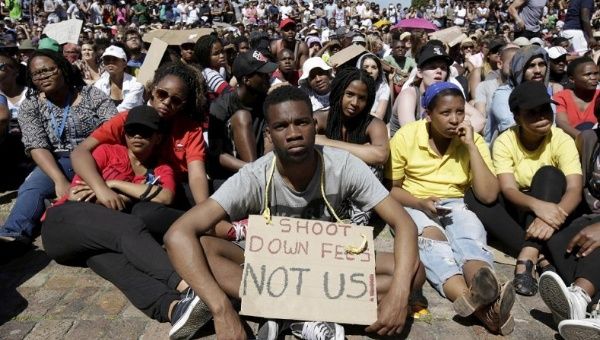 Students sit in protest during a mass demonstration on the steps of Jameson Hall at the University of Cape Town, October 22
In a victory for protesting students, South African President Jacob Zuma backtracked on October 23 and cancelled a planned university fee rise next year.
Students sit in protest during a mass demonstration on the steps of Jameson Hall at the University of Cape Town, October 22
In a victory for protesting students, South African President Jacob Zuma backtracked on October 23 and cancelled a planned university fee rise next year.
-
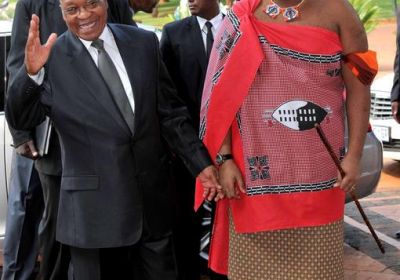
The International Trade Union Confederation (ITUC), campaigning groups and labour-supporting members of the European parliament launched protests this month about the continued harassment and jailing of trade unionists and democracy campaigners in Swaziland. ITUC general secretary Sharan Burrow has noted that, in Swaziland, “Violations against the fundamental rights of workers have become systemic”.
-
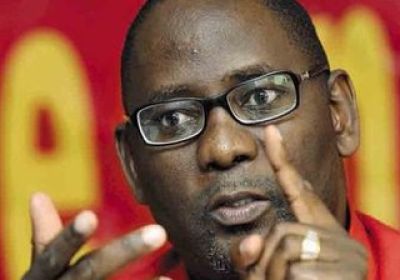
The United Front is a new organisation in South Africa initiated by the National Union of Metal Workers of South Africa (NUMSA) that held its first People's Assembly in December under the slogan “Kwanele Kwanele!” (Enough is Enough!)
-
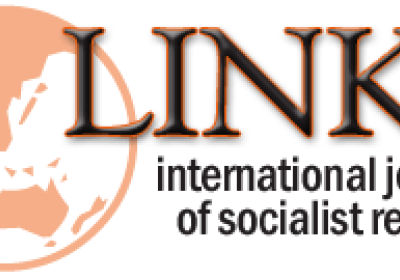
After 135 days of fearless resistance, the people of Kobane have liberated the city from the so-called Islamic State (IS). Since September 2014, the YPG and YPJ (People’s and Women’s Defence Units) have been leading an epic and unbelievable resistance against the latest wave of attacks by the IS.
-
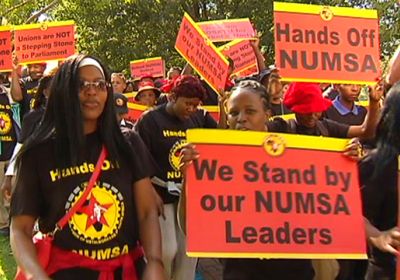 It is arguably the most important political development of South Africa’s post-1994 era. In the early hours of November 8, South Africa’s largest union, the National Union of Metalworkers of South Africa (NUMSA), was expelled from South Africa’s largest union federation, the Congress of South African Trade Unions (COSATU). The political significance of NUMSA’s expulsion derives from three key, interrelated areas of impact. ANC-led alliance
It is arguably the most important political development of South Africa’s post-1994 era. In the early hours of November 8, South Africa’s largest union, the National Union of Metalworkers of South Africa (NUMSA), was expelled from South Africa’s largest union federation, the Congress of South African Trade Unions (COSATU). The political significance of NUMSA’s expulsion derives from three key, interrelated areas of impact. ANC-led alliance -
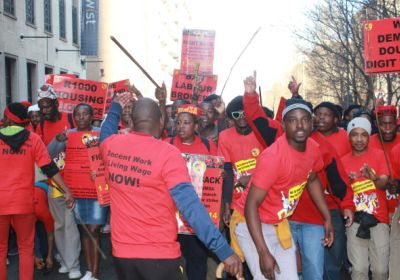 About 30 international guests and 120 shop stewards from the National Union of Metalworkers of South Africa (NUMSA) met over August 7 to 10 in Johannesburg to discuss building a new, left alternative to the ruling African National Congress (ANC). This challenge to the ANC by the country’s largest trade union, with more than 440,000 members, has caused shockwaves throughout the country. An August 6 Times Live article said the process was “likely to lead to the birth of a workers' party that will eventually challenge [the ANC] for power”.
About 30 international guests and 120 shop stewards from the National Union of Metalworkers of South Africa (NUMSA) met over August 7 to 10 in Johannesburg to discuss building a new, left alternative to the ruling African National Congress (ANC). This challenge to the ANC by the country’s largest trade union, with more than 440,000 members, has caused shockwaves throughout the country. An August 6 Times Live article said the process was “likely to lead to the birth of a workers' party that will eventually challenge [the ANC] for power”. -
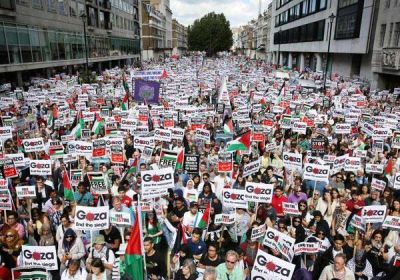
Hundreds of thousands of South African demonstrators marched through Cape Town on August 9 to protest against Israel’s military assault on Palestinians in Gaza, Morning Star Online said the next day.
-
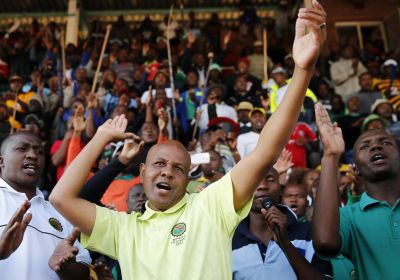 The stadium in Phokeng outside Rustenburg in South Africa's North West Province exploded in jubilation when the end of the longest strike in South Africa's history was announced on June 23. Men and women waved their arms victoriously in the air and resounding ululations and cheering reverberated as a great burden of domestic hardship lifted. Workers had changed history.
The stadium in Phokeng outside Rustenburg in South Africa's North West Province exploded in jubilation when the end of the longest strike in South Africa's history was announced on June 23. Men and women waved their arms victoriously in the air and resounding ululations and cheering reverberated as a great burden of domestic hardship lifted. Workers had changed history.